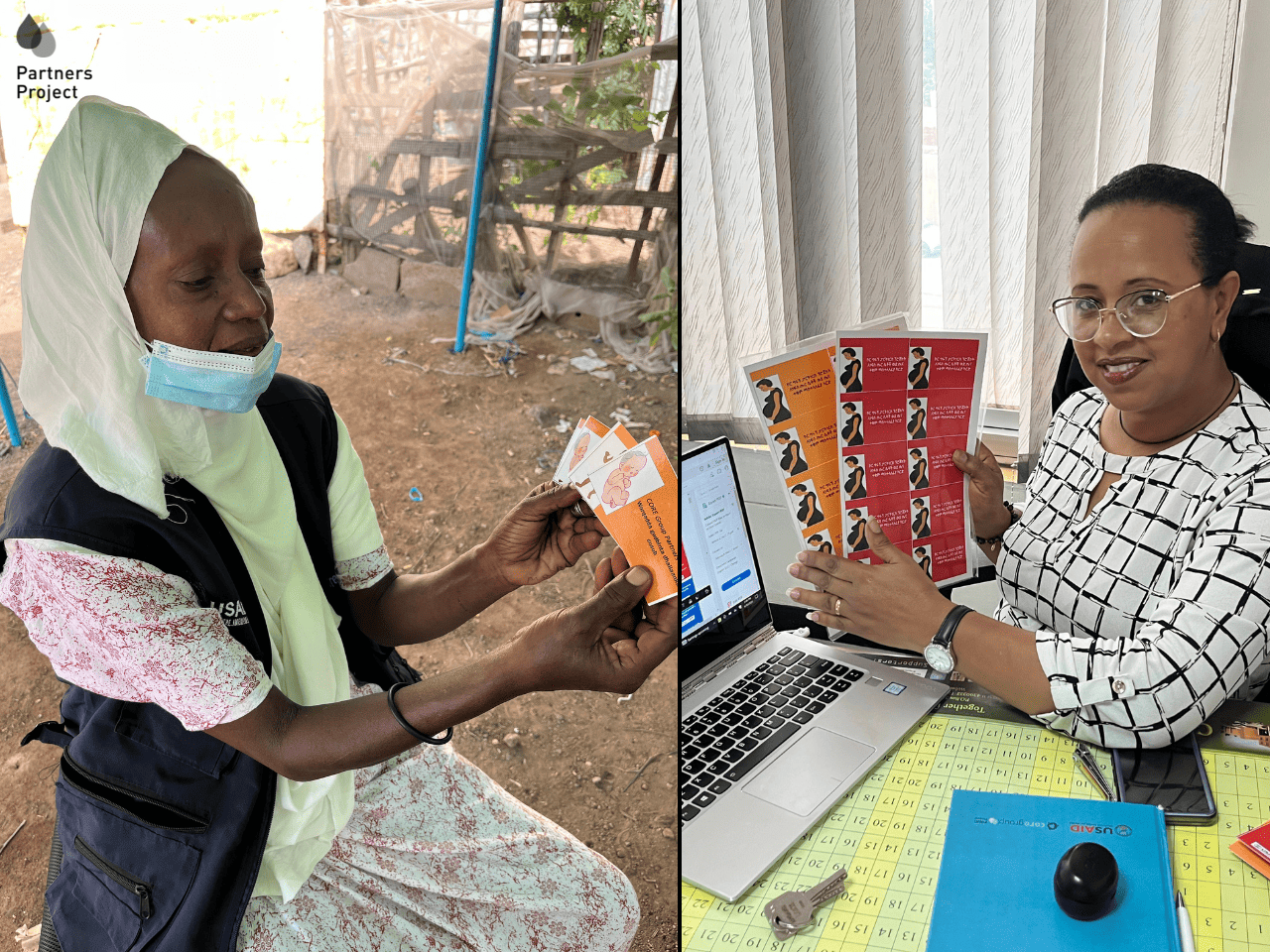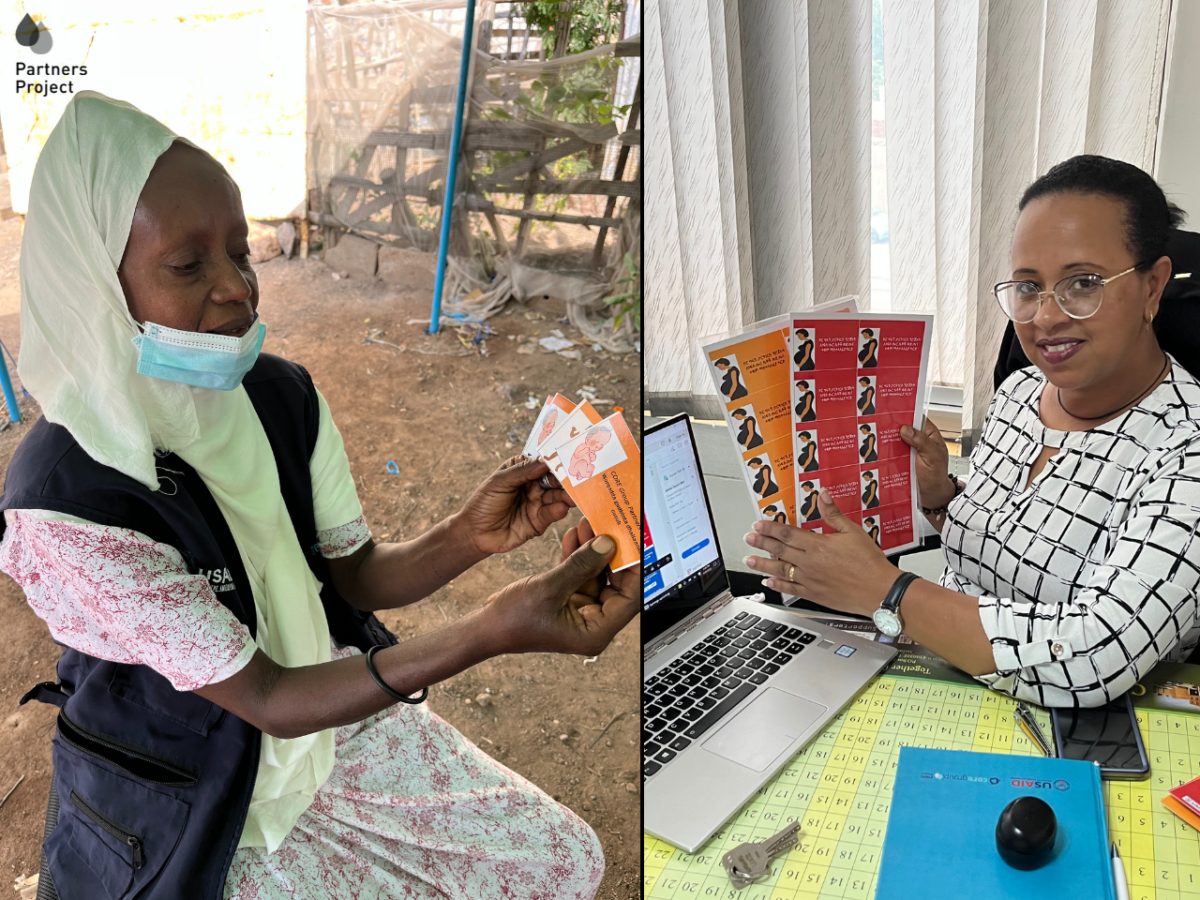On a Thursday morning in June 2023, 48-year-old Nefisa Mehmed sat under a green tarp draped over six skinny metal poles at the vaccination crossing point seven kilometers outside of Dewele Kebele on the border of Ethiopia and Djibouti. The border crossing just closed, and she took out her referral cards to show them to Samuel Abdissa, Health and Nutrition Senior Project Officer for Catholic Relief Services (CRS).
Nefisa is a community volunteer (CV) for the CORE Group Partners Project (CGPP), which works with implementing partners to strengthen community-based efforts in surveillance of and immunization for vaccine-preventable and priority zoonotic diseases. In Nefisa’s woreda (county), CGPP is implemented through Catholic Relief Service (CRS) and Hararghe Catholic Secretariate (HCS).

“I’ve noticed how many pregnant mothers and defaults I’ve referred so far,” Nefisa explained to Samuel. “I feel happy because the health center will acknowledge my contribution by counting and seeing the referral cards.”
CGPP Ethiopia has a total of 4,675 CVs that are active in the 80 woredas the project works in. CVs do not work for the government. They are unpaid volunteers who are selected from their communities to link the community to the government health facilities. CVs must be trusted community members, live in the community they serve in, and be 18 years or older. The woreda project staff selects CVs alongside the implementing partner. Trained on surveillance for vaccine-preventable diseases and priority zoonotic diseases, they commit to work at least four hours a week. Every six months, they receive refresher trainings.
Filimona Bisrat, secretariat director of CGPP Ethiopia, said that while the government agrees with the decision for this to be volunteer work, he has received pushback from other nongovernmental organization leaders about not paying volunteers. “Once you start paying them, and then the funding runs out for that particular project, what happens then? Everything isn’t validated by payment,” he said. For the sake of sustainability and generational mindset transformation, payment is limited to special immunization campaigns and monthly catchment meetings with health extension workers and health facility staff. For campaigns, which can last up to four days, CVs receive 200 birr per day, about the equivalent of $3.60 USD. CVs will also receive certificates and gifts of appreciation depending on the performance of the CVs at their respective kebele.
In Nefisa’s zone, illiteracy rate among CVs is 69 percent, yet one of their roles in the community is giving group health education sessions at community gatherings such as at the market and at mosques during prayer time. This is done through easy-to-understand pictorial flipbooks the CVs are trained to use.
Nefisa does not know it, but the recently implemented referral cards she held that morning have been a long-time project for CGPP. “It was three years ago that I had an idea for them and started working on it,” said Bethelehem Asegedew, communications advisor for CGPP Ethiopia. “When something comes to my mind, I share it with the rest of the staff and get their input. We were talking about how difficult it is to show the involvement of CVs.” Filimona agreed. “We had lots of discussions about referral cards. When we are developing something, it is always teamwork.” After implementing the input from the rest of the staff, Bethelehem drafted the next iteration. She then started looking for a printer. “We wanted it to be laminated and waterproof because of the extreme weather conditions in the hard-to-reach areas with thicker paper so they would last longer, but no provider would print to our specifications.” Then COVID-19 hit, and the project was put on hold.
In the fall of 2022, Bethelehem looked into finding a printer again. “We decided we’d try to print something and that would be better than printing nothing.” She said that a lower-quality material was found after a lot of searching. CGPP had them printed in April 2023 and announced to the 11 implementing partners to come get them from the CGPP office at the Consortium of Christian Relief and Development Association (CCRDA) office in Addis Ababa, the capital city for Ethiopia. Bethelehem said that all the partners are excited to have this new resource. “This is an innovative resource we hope others will replicate,” said Filimona.
Samuel believes the cards will be effective for everyone involved. “The referral cards will be helpful for the beneficiaries, community volunteers, and the woreda project staff. For the beneficiaries, they are easily reminded to go to the health care facility to get the needed service,” he said. “For CVs, they can take pride in what they’ve contributed through the referral cards will also indirectly help staff evaluate if the planned activities are on the right track for the reporting period.
Bethelehem first saw the cards in use at the vaccination crossing point. “I felt proud when I saw Nefisa pull out her referral cards and show them to us. It is nice to see something you did has an impact. I hope to see more mothers and children brought to the health facilities because of this.”
Bethelehem said that these cards help the overall work of tracking zero-dose children, children who haven’t received routine immunizations from birth, and registering pregnant women and newborns. “It’s easy for the community members to register at the health centers through them, and it helps the mothers remember to go. And now the CVs work can be tracked.” Yohannes Abebe, 43, serves as the Ayesha Woreda Field Officer and focal point for CGPP. He knows the value of the CVs even without tracking their referrals. “The CVs give health education and information and share the use of the vaccines to the community. They inform caretakers that effect or consequences if their children do not take the vaccines, the community comes to understand and internalizes it. This results in many community members coming to the health center for immunizations. The relationship between the CVs, the mothers and caretakers are smooth and friendly,” he said. Still, he’s about the referral cards. “We thank CGPP for creating these, and they are waterproof too. They’re great,” he said.
The health extension worker who receives the referral card from the caregiver or mother will document which CV it came from. Each CV has five cards for each of the three categories.
Bethelehem said CGPP tried to find a way to have a weatherproof card holder to protect the cards but could not find any printers that would create it. She said that she hopes these current cards can last a couple of years. “Maybe we can find better quality printers sometime in the future. Sometimes when it’s something new, it’s not easy to find a printer who will take a chance on creating it,” she said.
For now, Nefisa can walk into the Dewele Health Center and proudly see the cards that have returned to the center visibly in the pocket folder on the wall.

